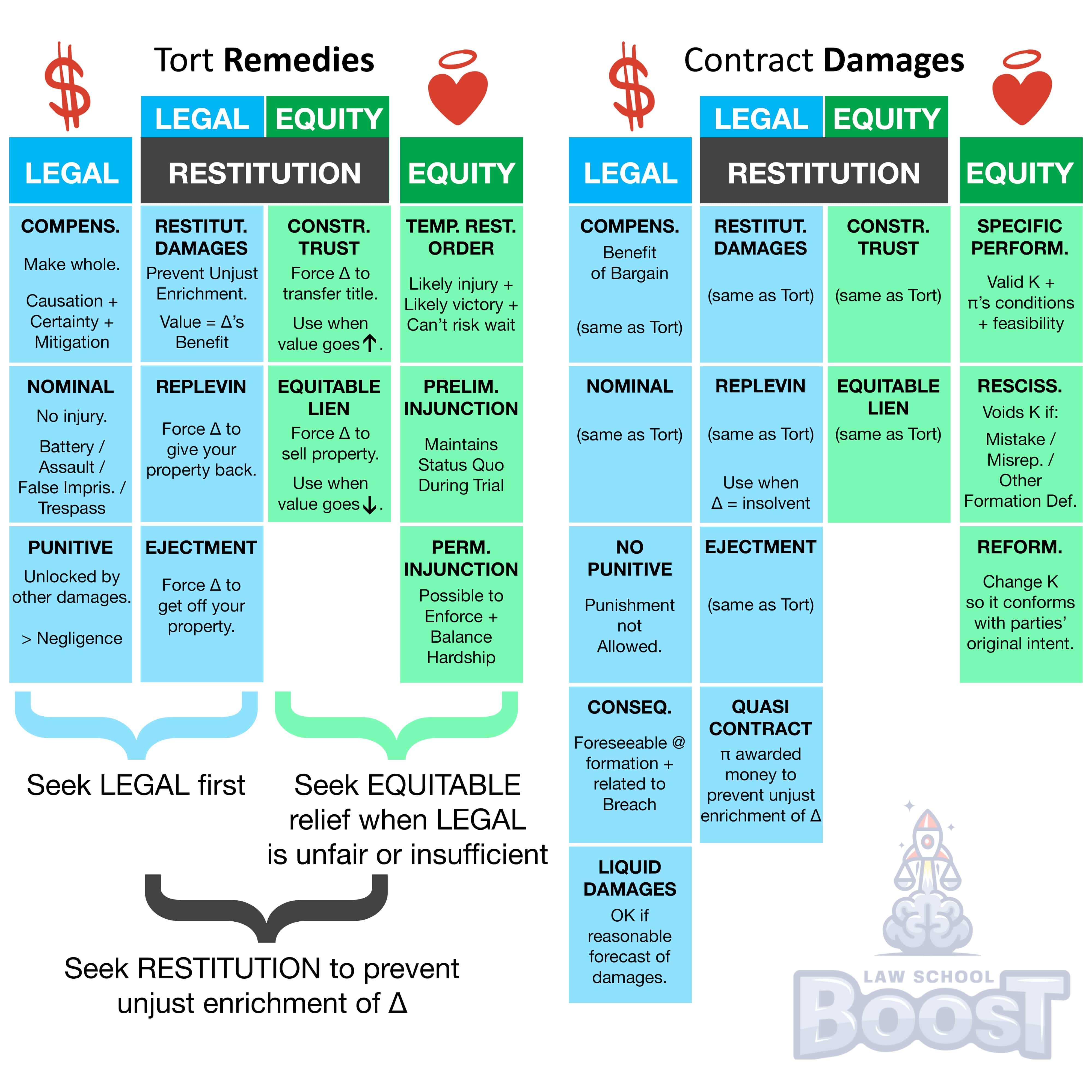🏥
Remedies • Tort - Equitable Remedies
REM#027
Legal Definition
Ejectment may be inadequate because the sheriff may refuse to act (e.g., will not tear down an encroaching structure).
Plain English Explanation
Ejectment is a legal way to get someone (or something) off of your property if they shouldn't be there. But sometimes the police might not do what the court says because they don't want to cause trouble or harm someone's property. For example, if someone built a shed on your property without your permission, the court might say they have to remove it, but the sheriff might not want to tear down the shed.
Hypothetical
Hypo 1: Bob starts a small farm on a piece of land he believes is his. However, the land actually belongs to Sam. The court orders Bob to remove all his crops and animals (ejectment). But the sheriff is concerned about the welfare of the animals and doesn't want to forcibly remove them. Result: The court realizes that just ordering Bob to remove everything isn't practical. They might decide that Bob should compensate Sam for the use of the land and give him time to relocate his farm.
Hypo 2: Bob sets up a carnival on Sam's vacant lot without permission. The court orders Bob to pack up the carnival and leave (ejectment). However, the sheriff is worried about the large crowd and potential unrest if they try to shut down the carnival immediately. Result: The court might allow the carnival to continue for a short, specified period, but Bob would have to pay Sam for the use of his land and ensure the lot is returned to its original state afterward.
Hypo 3: Bob, thinking he's on public land, constructs a memorial statue dedicated to a local hero. In reality, the land belongs to Sam. The court orders Bob to remove the statue (ejectment). The sheriff, recognizing the statue's significance to the community, is hesitant to dismantle it. Result: The court might decide that the statue can remain, but Bob would need to compensate Sam for the land or buy the portion of the land where the statue stands.
Hypo 4: Bob dumps a large amount of waste on Sam's property, thinking it's a public dumpsite. Sam takes the matter to court, and the court orders Bob to clean up the waste (ejectment). The sheriff is ready and willing to oversee the cleanup. Result: In this case, the rule doesn't apply. The court's order can be easily enforced with the sheriff's help, and Bob would have to clean up the waste immediately.
Hypo 2: Bob sets up a carnival on Sam's vacant lot without permission. The court orders Bob to pack up the carnival and leave (ejectment). However, the sheriff is worried about the large crowd and potential unrest if they try to shut down the carnival immediately. Result: The court might allow the carnival to continue for a short, specified period, but Bob would have to pay Sam for the use of his land and ensure the lot is returned to its original state afterward.
Hypo 3: Bob, thinking he's on public land, constructs a memorial statue dedicated to a local hero. In reality, the land belongs to Sam. The court orders Bob to remove the statue (ejectment). The sheriff, recognizing the statue's significance to the community, is hesitant to dismantle it. Result: The court might decide that the statue can remain, but Bob would need to compensate Sam for the land or buy the portion of the land where the statue stands.
Hypo 4: Bob dumps a large amount of waste on Sam's property, thinking it's a public dumpsite. Sam takes the matter to court, and the court orders Bob to clean up the waste (ejectment). The sheriff is ready and willing to oversee the cleanup. Result: In this case, the rule doesn't apply. The court's order can be easily enforced with the sheriff's help, and Bob would have to clean up the waste immediately.
Visual Aids

Related Concepts
What are equitable remedies in tort?
What are the defenses to a suit seeking injunctive relief?
What is a preliminary injunction and how is it issued?
What is a temporary restraining order ("TRO") and what is required to get one?
What is contempt?
What is the collateral bar rule?
What parties are bound by an injunction?
When assessing a permanent injunction, how do courts balance hardships?
When assessing defenses to a lawsuit seeking injunctive relief, when are unclean hands applicable?
When assessing defenses to a lawsuit seeking injunctive relief, when is impossibility applicable?
When assessing defenses to a lawsuit seeking injunctive relief, when is laches applicable?
When deciding on applying a permanent injunction, when may money damages be inadequate?
When may replevin be inadequate as a remedy and, instead, a court will opt for a permanent injunction?
When will a court issue a permanent injunction?


